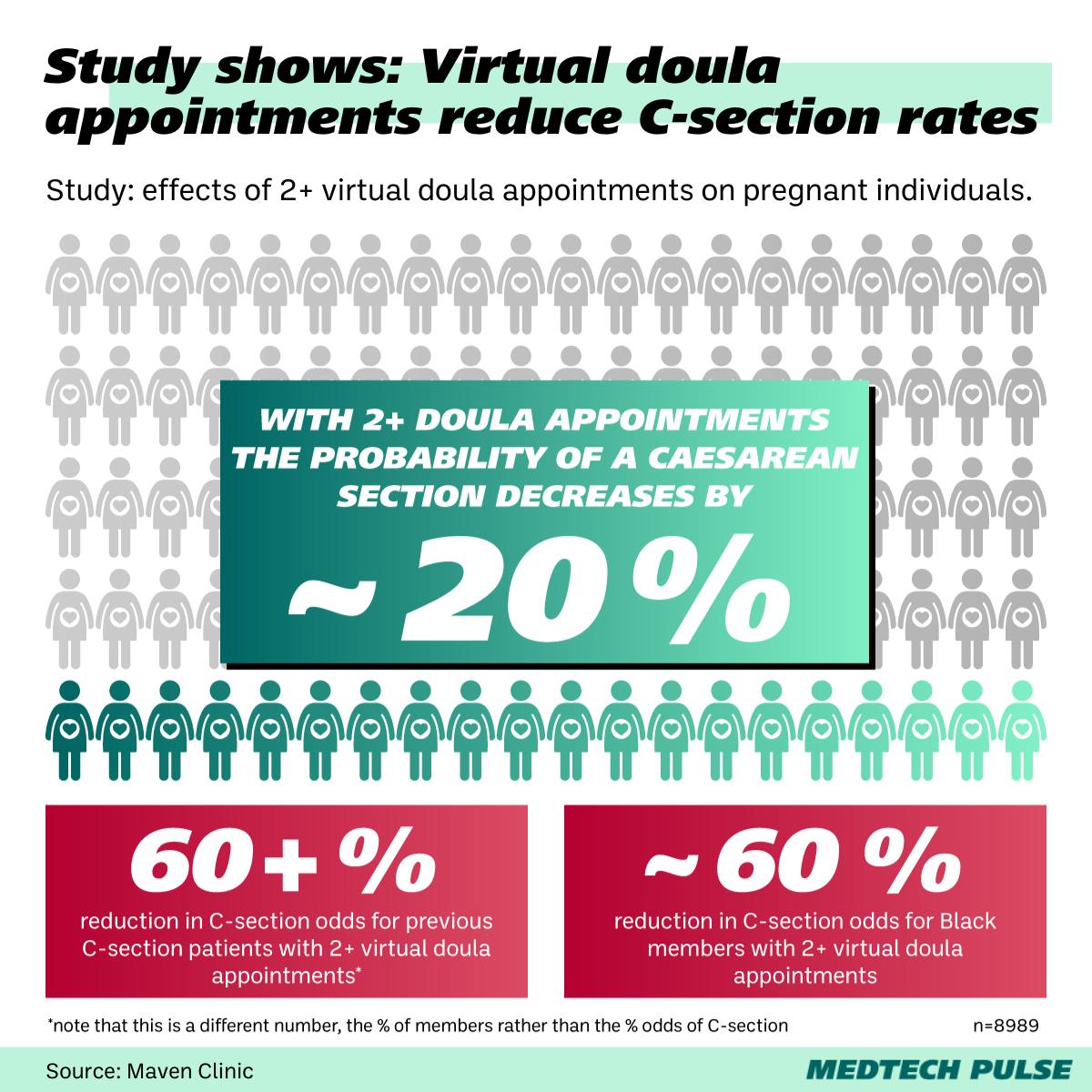Virtual doulas can help make childbirth safer
The rise of telehealth has changed healthcare for the better in many ways. At MedTech Pulse, we continue to be pleasantly surprised by the many diverse applications of virtual care.
This week is no different. As it turns out, telehealth is even improving childbirth.
A new study by femtech startup Maven Clinic evaluated the impacts of their virtual doula program on improving childbirth experiences and safety. The study was published in Obstetrics and Gynecology last month.
The results present a compelling case for increasing virtual options in maternity care. Let’s dig into the data.
What is a virtual birth doula?
So, what do birth doulas actually do?
Birth doulas are nonmedical labor support professionals. Their training allows them to minimize pregnant people’s stress and anxiety during labor and childbirth. Research has even demonstrated that using a doula can significantly reduce rates of surgical birth (C-section) and other medical interventions—overall increasing positive outcomes.
Doulas’ popularity has been growing in the U.S., but still only around six percent of births are supported this way nationwide.
Maven is currently the world’s largest virtual women’s and family health clinic. Their virtual doula program has been redefining how patients can prepare for childbirth.
At Maven, virtual doulas:
- Help create a birth plan
- Discuss birth positions and breathing techniques
- Teach patients how to advocate for themselves during birth
According to Maven’s data, even virtual meetings with doulas can make a positive impact on birth experiences. Maven members who met with a virtual doula at least two times reported:
- Feeling supported in deciding delivery preference
- Learning medically accurate information
- Experiencing a higher level of emotional support
- Better managing mental health
“Doulas are so important because we help educate birthing parents,” said Blue Andrew, Maven Care Advocate and Doula at Brooklyn Birth. “We normalize advocating for yourself and having ownership and autonomy over one’s body, which many people don’t experience as part of their birthing process. Doulas are there to carry and support parents through one of the most vulnerable times of their lives.”
Increasing birth safety with innovation
But doulas don’t just make patients more comfortable and informed regarding birth—though those impacts are important.
By decreasing the likelihood of medical and surgical interventions by keeping pregnant people less stressed and more informed, doulas improve childbirth safety.
Maven is seeing those impacts for virtual doulas too.

Patients who attended two or more virtual doula appointments lowered their C-section odds by nearly 20 percent.
These effects are most pronounced for Black patients, which is especially exciting since Black patients are disproportionally likely to face the dangers of C-section births. Black patients who attended two or more virtual doula appointments had a 60 percent lower likelihood of C-section.
These results present a game-changing tool as the U.S. continues to rank worst in its peer nations in maternal mortality. The country’s high rates of unnecessary birth intervention and racial and class disparities in maternal care drive these poor outcomes.
These are disparities that the relatively simple access to virtual doula care can help significantly address.
Of course, Maven can’t address this need alone. This is why we’re excited they’re not the only player in the virtual birth care space. More providers and innovators are seeing the value—even the urgency—in disrupting the state of maternity care. Startups like virtual doula company Major Care are beginning to grow.
Major Care founder and CEO Mandy Major said of this trend and the Maven study: “Virtual doula care enhances accessibility, addresses equity gaps, and allows us to build trust with a continuous care model that involves episodic video care and proactive text-based care. Now, with this data, I hope we can really mobilize around remote doula care for the greater good.”
We’ll be keeping our eyes on this space, and we believe the medtech industry overall should, too. As we’re seeing in this edition’s Chart of the Week, femtech is getting more attention—and for good reason. Patients in this area have been overlooked for too long.